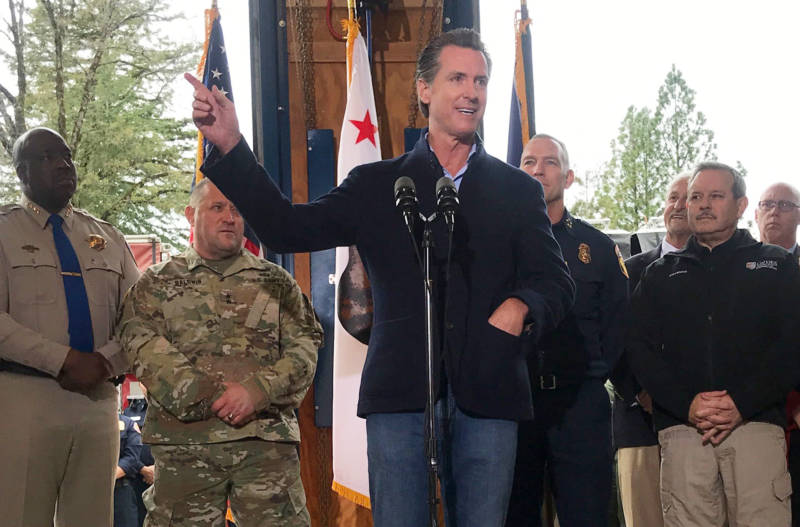Still, history may not be a reassuring factor. When PG&E last filed for bankruptcy 18 years ago, California’s governor ended up losing his job.
Even though Gov. Gray Davis didn’t cause the 2001 energy crisis in California — which saddled PG&E with billions in debt and led it to file for bankruptcy — voters still booted him out of office two years later in the state’s first and only gubernatorial recall to date.
It's too early to know what advice Newsom will need, Davis told KQED on Monday. But he did warn that bankruptcy proceedings strip power from elected officials and steer it to a bankruptcy judge.
"The reality is once it's in bankruptcy, you know, there's a limit to what laws can be passed," Davis said. "It's really the bankruptcy lawyers and the bankruptcy judge that takes over the process. So I don't want to say it sidelines the Legislature and the governor, but it's far more difficult for them to work their will once a company goes into bankruptcy."
Politically, though, things are pretty different for Newsom than they were for Davis, noted Sonenshein.
"Unlike what happened with Gray Davis, we're not in the midst of a massive electricity crisis," he said.
Back then, Sonenshein said, the crisis was literally hitting home for voters: Californians endured rolling blackouts and brownouts and a lot of uncertainty about the state's ability to pay for power.
Newsom, by contrast, has worked hard this week to reassure the public that the lights will stay on -- and as long as that’s the case, Sonenshein said, it's a totally different scenario.
"It is more of an opportunity,” he said. “I think it's a really hard question, and finding the right balance and not rushing, I think, is going to be really important in this. Because whatever they come up with is going to have to last for quite a while."
State Sen. Jerry Hill, D-San Mateo, who has been a vocal critic of PG&E ever since the company’s gas line exploded in his district in 2010, killing eight people, agreed that the state should tread carefully.
"This creates an opportunity for the Legislature and the state and the governor to sit back and step back from this for a while and take a deep breath and look at what the options are," he said. "But I think we need to put all of the options and all of the consequences of bankruptcy on the table and see what they are, before we take any action."
Hill has proposed breaking up PG&E, or exploring whether the state could take it over. And some other longtime critics of the controversial and powerful company think this just might be the time to consider such extreme proposals. Some, however, remain skeptical that Newsom would be on board for that.
"Gavin Newsom never took on PG&E when he was mayor," said Tim Redmond, a San Francisco journalist and activist who has long pushed for a public alternative to the corporate utility. "He really was not a guy who wanted to move something that was in the private sector into the public sector. In fact, philosophically, he tended to go the opposite way. He was a business owner and I think he thought that private businesses are more efficient."
But Redmond said if ever there was a time for change, this would be it.
"PG&E has made such a mess of its own business. I think that their public relations are so bad right now, and their reputation, that there may be an opening," he said.
For his part, Newsom seems well aware that all eyes are on him. In recent days, he has sought to reassure Californians that their electricity is secure, that the current situation is a top priority for his administration, and that he will put the public first.
He said that the public should be reassured by his long relationship with many of the leaders at PG&E -- not wary that those connections could influence his decisions as governor.
"It allows me to pick up the phone, because I have the cellphone of some of the executives, and have very honest conversations,“ he said. "You know, the flip side of that -- someone could say, 'Well he's too familiar with them, so he lacks objectivity.' ”
He added: “I try to be objective about these things as much as I can. I'm a fiduciary to the people of the state of California. That's my role: to protect your interests, not PG&E’s interests.”
And on Monday, hours after the bankruptcy announcement, Newsom indicated that he will take a tough stance with the utility.
"PG&E, with respect, has not been a trusted player in the past. They have admitted to knowingly misleading regulators in the past -- the very recent past," he said.

